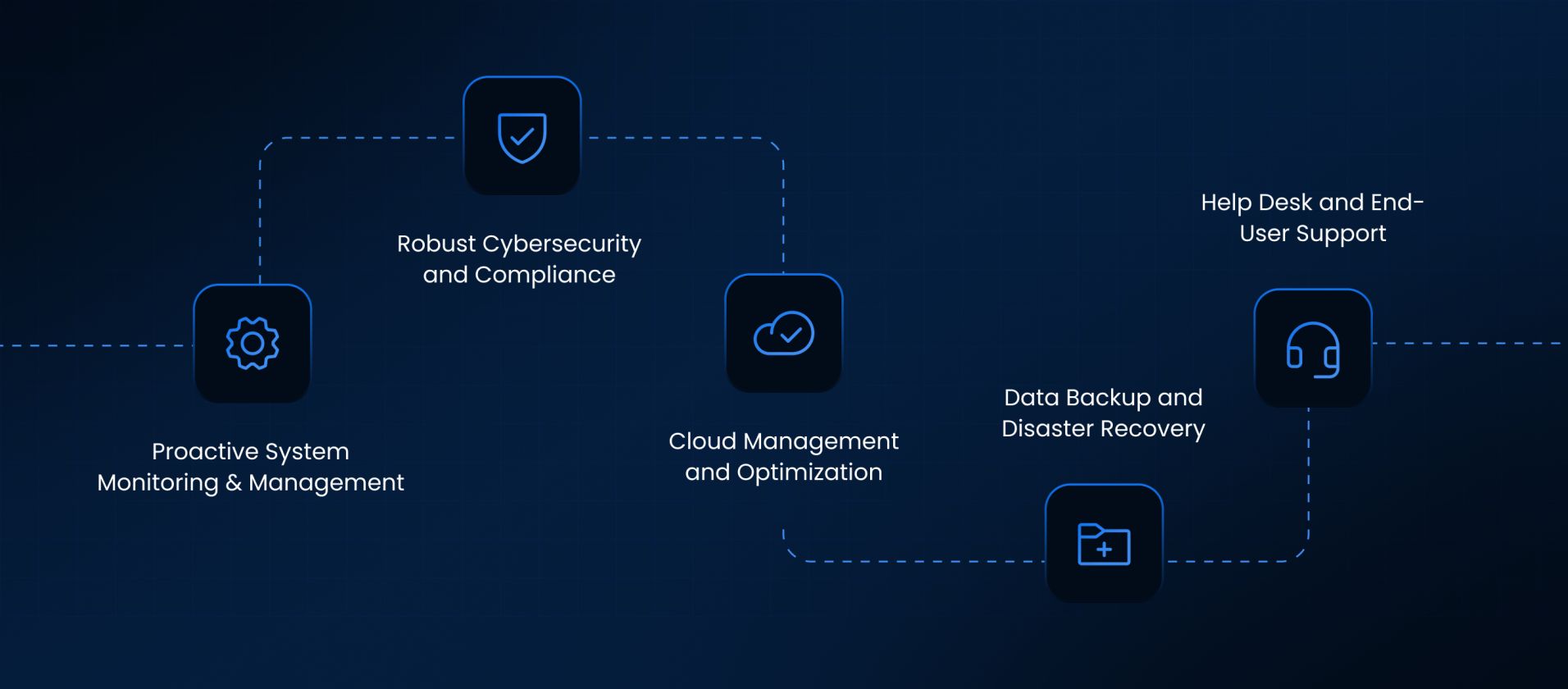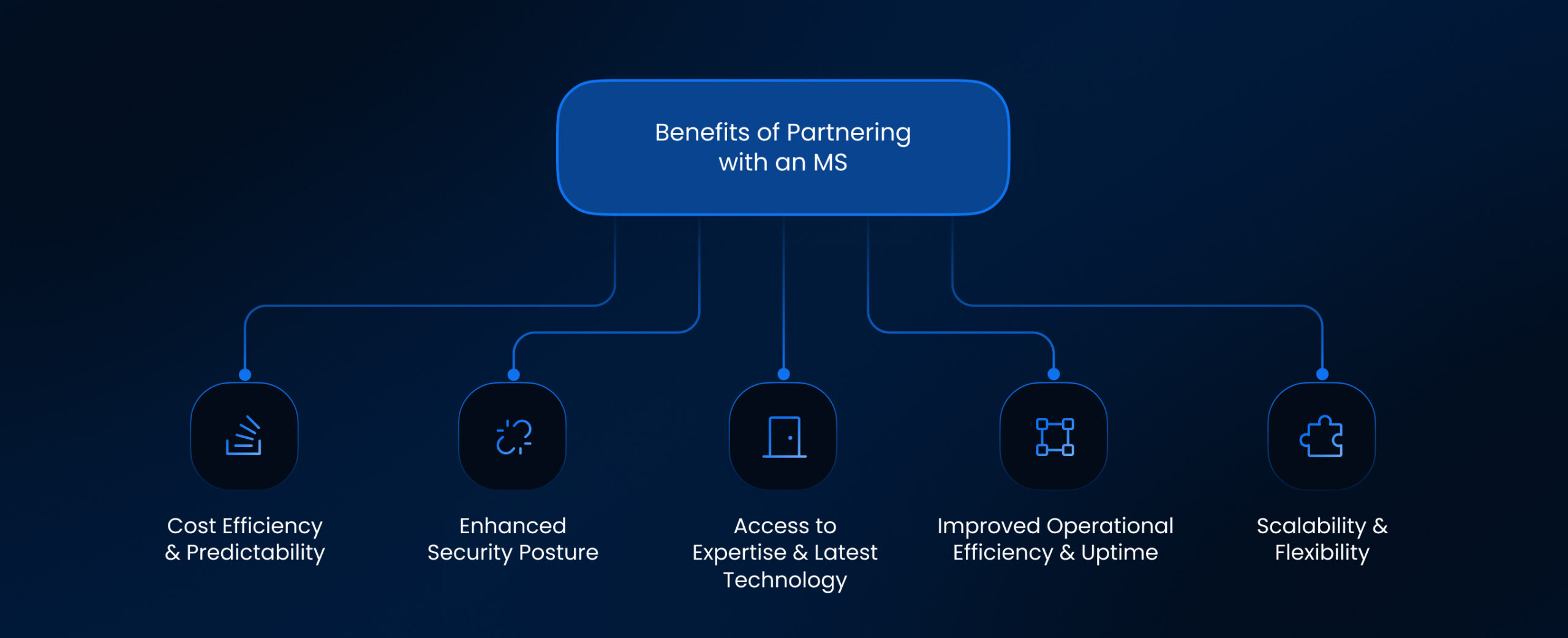Introduction
For leaders overseeing the vast digital landscapes of large American companies, navigating the complexities of IT operations is a constant challenge. In 2025, that challenge is amplified by rapid technological shifts, escalating cybersecurity threats, and the relentless demand for greater efficiency. This is precisely where a strategic IT managed services provider (MSP) becomes indispensable. Instead of simply fixing problems, a modern MSP empowers your team to innovate, transforming IT from a cost center into a powerful engine for business growth.
What Are IT Managed Services Providers (MSPs)?
Imagine you’re running a busy airline. You could own and maintain every single plane, hire every pilot, and manage all ground crew yourself. Or, you could partner with a specialized company that handles a fleet of aircraft, provides highly trained personnel, and ensures smooth operations, allowing you to focus on routes, customer experience, and business strategy. That’s essentially what an IT managed services provider does for your technology infrastructure.
An MSP is a third-party company that remotely manages a client’s information technology services or equipment. This includes a wide array of responsibilities, from network monitoring and security to data backup and help desk support. In the evolving landscape of 2025, this partnership goes far beyond basic maintenance. It’s about proactive management, predictive analysis, and strategic guidance to keep your IT systems robust, secure, and aligned with your organizational goals. For instance, they might leverage artificial intelligence to foresee potential network slowdowns before they impact your workforce.
Core Services Offered by Leading MSPs
The scope of services from a top-tier IT managed services provider in 2025 is comprehensive, designed to cover nearly every aspect of your enterprise’s IT needs. Therefore, they become an extension of your team, providing specialized expertise and continuous oversight.

- Proactive System Monitoring and Management: Modern MSPs don’t wait for things to break. Instead, they use advanced tools to continuously monitor your networks, servers, and applications, often employing sophisticated algorithms to detect anomalies and potential issues. This proactive stance significantly reduces downtime and ensures smooth operations.
- Robust Cybersecurity and Compliance: With cyber threats becoming increasingly sophisticated, an MSP offers a layered defense. This includes implementing zero-trust architectures, managing firewalls, conducting regular vulnerability assessments, and ensuring compliance with industry regulations. They are vigilant guardians of your digital assets.
- Cloud Management and Optimization: As more enterprises move to the cloud, MSPs help manage and optimize cloud environments, whether it’s a public, private, or hybrid setup. They ensure your cloud resources are efficient, secure, and cost-effective, preventing unexpected expenditures.
- Data Backup and Disaster Recovery: Protecting your company’s data is paramount. An MSP implements robust backup strategies and develops comprehensive disaster recovery plans, ensuring business continuity even in the face of unforeseen events. Thus, you can recover quickly from any data loss scenario.
- Help Desk and End-User Support: While Leena AI revolutionizes how employees get support, an MSP can augment or even fully manage your help desk operations. They ensure your employees receive timely assistance for their IT issues, improving productivity and satisfaction.
Benefits of Partnering with an MSP
Choosing a strategic IT managed services provider brings a multitude of advantages that directly impact your bottom line and operational efficiency. Furthermore, it allows your internal teams to focus on innovation rather than maintenance.

- Cost Efficiency and Predictability: Instead of unexpected repair costs and large capital expenditures, an MSP offers predictable monthly fees. This helps with budgeting and eliminates the need for expensive in-house specialists for every niche IT area.
- Enhanced Security Posture: By partnering with an MSP, you gain access to specialized cybersecurity expertise and cutting-edge tools that might be cost-prohibitive to develop in-house. They stay abreast of the latest threats and mitigation strategies, bolstering your defenses.
- Access to Expertise and Latest Technology: MSPs employ a team of certified professionals with diverse skill sets and are constantly investing in the newest technologies and training. This means your company benefits from top-tier expertise without the overhead of hiring and training. Consequently, you always have access to the latest innovations.
- Improved Operational Efficiency and Uptime: With proactive monitoring and maintenance, an MSP significantly reduces IT downtime and streamlines operations. This translates directly to increased productivity across your entire organization.
- Scalability and Flexibility: As your business grows or contracts, an MSP can quickly scale your IT services up or down to match your needs. This agility is crucial for adapting to market changes and strategic initiatives without significant internal resource reallocation.
How Leena AI Enhances IT Operations with Agentic AI
At Leena AI, we understand that even with an excellent IT managed services provider, your internal support teams still face an enormous volume of tickets across IT, HR, and Finance. This is where our pioneering Agentic AI solutions step in. We’re not replacing your MSP; we’re supercharging your entire employee experience by intelligently resolving tickets faster and more efficiently.
Our Agentic AI, leveraging a sophisticated Large Language Model (LLM), acts as a highly intelligent, autonomous assistant for your employees. It can:
- Instantly Resolve Common IT Issues: Imagine an employee needing to reset their password or request access to a software application. Leena AI can handle these requests autonomously, guided by your company’s specific policies and workflows, without human intervention.
- Provide Smart, Contextual Answers: Employees can ask questions in natural language, and Leena AI will provide precise, personalized answers drawn from your knowledge base, ensuring consistent and accurate information.
- Automate Complex Workflows: For more involved requests, our AI can initiate and manage multi-step workflows, such as provisioning new software for a team, all while keeping the employee updated on progress.
- Reduce Ticket Volume for Your Team: By resolving a significant percentage of inquiries automatically, Leena AI dramatically reduces the workload on your IT support staff. This frees them up to focus on more complex, strategic projects that require human creativity and problem-solving.
- Integrate Seamlessly: Our platform integrates effortlessly with your existing ticketing systems, human resources platforms, and financial systems, ensuring a unified and efficient experience.
Integrating Leena AI into Your IT Infrastructure
Integrating Leena AI with your existing IT infrastructure, including the services provided by your IT managed services provider, is designed to be smooth and non-disruptive. We understand the importance of seamless transitions and data integrity.
First, Leena AI’s platform is built with robust API integration capabilities. This allows it to connect directly with popular enterprise ticketing systems, like ServiceNow, Jira Service Management, and Zendesk, as well as various Human Resources Information Systems (HRIS) and Enterprise Resource Planning (ERP) solutions. Therefore, our AI can retrieve information, update records, and trigger actions across your diverse technology landscape.
Second, the implementation process involves training our Agentic AI on your specific company knowledge bases, policies, and workflows. This ensures that the AI’s responses and actions are perfectly tailored to your organization’s unique requirements. Working alongside your internal teams and your IT managed services provider, we configure the AI to understand your enterprise’s nuances, ensuring it provides accurate and compliant support. The goal is to augment your existing setup, enhancing its capabilities without disrupting established processes.
The Future of IT Managed Services: Trends and Innovations
Looking ahead to 2025 and beyond, the role of the IT managed services provider is evolving rapidly, driven by several key trends and technological innovations. This evolution promises even greater efficiency and strategic value for your enterprise.
- AIOps and Predictive Analytics as Standard: Expect MSPs to universally adopt AIOps, which uses artificial intelligence to analyze vast amounts of operational data, predict potential issues before they arise, and even automate their resolution. This means your systems will be self-healing, minimizing downtime to an unprecedented degree.
- Hyper-Personalization of Services: Future MSPs will leverage AI and machine learning to offer increasingly tailored services. They will understand your specific business needs, anticipate future requirements, and proactively recommend strategic IT improvements rather than just reactive maintenance.
- Enhanced Cybersecurity Automation: The battle against cyber threats will be fought with increasingly sophisticated AI-driven tools. MSPs will deploy autonomous security agents that can detect, analyze, and neutralize threats in real-time, often without human intervention, ensuring continuous protection.
- Sustainability and Green IT Initiatives: With a growing focus on environmental responsibility, MSPs will play a larger role in helping enterprises optimize their IT infrastructure for energy efficiency. This includes cloud optimization and recommending eco-friendly hardware solutions, contributing to your corporate social responsibility goals.
- Integrated Vendor Consolidation: The trend towards simplifying vendor relationships will accelerate. Your MSP will likely become your single point of contact for a broader range of IT services, from cloud architecture to specialized application management, simplifying your operational overhead.
By partnering with an forward-thinking IT managed services provider and integrating innovative solutions like Leena AI, you are not just managing your IT; you are transforming it into a dynamic, intelligent, and resilient asset ready for the demands of 2025 and beyond.
Frequently Asked Questions (FAQs)
1. What exactly is an IT managed services provider?
An IT managed services provider is a company that takes on the responsibility of managing a client’s information technology services, often remotely. This can include everything from network maintenance and cybersecurity to help desk support. They aim to proactively manage your IT infrastructure to prevent issues and ensure smooth operations.
2. How do IT managed services providers help large US companies?
For large US companies, an IT managed services provider offers specialized expertise, predictable IT costs, enhanced cybersecurity, and improved operational efficiency. They allow internal IT teams to focus on strategic initiatives rather than day-to-day maintenance, which is crucial for innovation and growth.
3. What are the key trends for IT managed services in 2025?
In 2025, key trends for an IT managed services provider include widespread adoption of AIOps for predictive maintenance, a stronger focus on cybersecurity automation, hyper-personalization of services, and a drive towards sustainable IT practices. They are becoming more strategic partners, not just service providers.
4. Can an IT managed services provider help with cloud migration and management?
Yes, absolutely. A leading IT managed services provider is adept at assisting with cloud migration strategies, ensuring a smooth transition to public, private, or hybrid cloud environments. They also continuously manage and optimize cloud resources to ensure performance, security, and cost-effectiveness for your enterprise.
5. How does Agentic AI from Leena AI complement an IT managed services provider?
Leena AI’s Agentic AI solution enhances the services provided by an IT managed services provider by automating the resolution of common employee queries across IT, HR, and Finance. This significantly reduces the volume of tickets your MSP or internal IT team handles, allowing them to focus on more complex issues and strategic projects. It optimizes the employee support experience.
6. What kind of security benefits can an IT managed services provider offer?
An IT managed services provider offers robust security benefits, including implementing advanced cybersecurity frameworks like Zero-Trust, managing firewalls, conducting regular vulnerability assessments, and ensuring compliance with industry regulations. They provide expert defense against the ever-evolving landscape of cyber threats, safeguarding your company’s digital assets.
7. Why is scalability important when choosing an IT managed services provider?
Scalability is vital because your business needs can change rapidly. A good IT managed services provider can quickly adjust IT services, scaling up or down, to match your company’s growth or evolving requirements. This flexibility ensures your IT infrastructure always aligns with your business strategy, without costly over-provisioning or under-resourcing.













